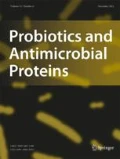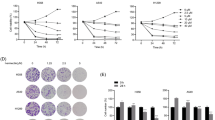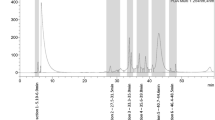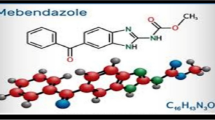Abstract
Drug resistance is one of the major problems, which causes recurrence of cancers. Therefore, complementary treatments are needed to improve the impacts of chemotherapy agents. The effect of probiotics as cancer-preventing agents through involvement in the activation of apoptotic pathways has been established. The present study sought to investigate how the heat-killed form of Saccharomyces cerevisiae (as a probiotic) could affect the Akt/NF-kB-induced apoptosis in colon cancer cells, the SW480 cell line. The cytotoxic effects of heat-killed yeast (HKY) and 5-fluorouracil (5-FU, as a positive control drug) were assayed using the MTT method. Morphological changes followed by apoptosis were examined using DAPI staining. The transcription and translation level of apoptosis genes were explored with qRT-PCR and western blotting. The data were analyzed using GraphPad Prism V6.0 Software. The results showed that HKY could induce apoptosis in colon cancer cell line through downregulation of p-Akt1, Rel A, Bcl-XL, pro-caspase 3, and pro-caspase 9 expressions, and upregulation of BAX, cleaved caspase-3, and cleaved caspase-9. Besides, Akt protein expression was not affected. It is noticeable that HKY had a better modulating effect on BAX expression compared with 5-FU. It was able to modulate Akt/NF-kB signaling pathway followed by the apoptotic cascade.





Similar content being viewed by others
References
Siegel RL, Miller KD, Jemal A (2016) Cancer statistics, 2016. CA Cancer J Clin 66(7):30–30. https://doi.org/10.3322/caac.21332
Lotfi-Attari J, Pilehvar-Soltanahmadi Y, Dadashpour M, Alipour S, Farajzadeh R, Javidfar S, Zarghami N (2017) Co-delivery of curcumin and chrysin by polymeric nanoparticles inhibit synergistically growth and hTERT gene expression in human colorectal cancer cells. Nutr Cancer 69:1290–1299. https://doi.org/10.1080/01635581.2017.1367932
Carnesecchi S, Langley K, Exinger F et al (2002) Geraniol, a component of plant essential oils, sensitizes human colonic cancer cells to 5-fluorouracil treatment. J Pharmacol Exp Ther 301:625–630. https://doi.org/10.1124/jpet.301.2.625
Chong ESL (2014) A potential role of probiotics in colorectal cancer prevention: review of possible mechanisms of action. World J Microbiol Biotechnol 30:351–374. https://doi.org/10.1007/s11274-013-1499-6
Uccello M, Malaguarnera G, Basile F, D’agata V, Malaguarnera M, Bertino G, Vacante M, Drago F, Biondi A (2012) Potential role of probiotics on colorectal cancer prevention. BMC Surg 12(Suppl 1):S35. https://doi.org/10.1186/1471-2482-12-S1-S35
Zhong L, Zhang X, Covasa M (2014) Emerging roles of lactic acid bacteria in protection against colorectal cancer. World J Gastroenterol 20(24):7878–7886. https://doi.org/10.3748/wjg.v20.i24.7878
Cousin FJ, Jouan-Lanhouet S, Dimanche-Boitrel M-T, Corcos L, Jan G (2012) Milk fermented by Propionibacterium freudenreichii induces apoptosis of HGT-1 human gastric cancer cells. PLoS One 7:e31892. https://doi.org/10.1371/journal.pone.0031892
Shamloo HB, Golkari S, Faghfoori Z et al (2016) Lactobacillus casei decreases organophosphorus pesticide diazinon cytotoxicity in human HUVEC cell line. Adv Pharm Bull 6:201–210. https://doi.org/10.15171/apb.2016.028
Konishi H, Fujiya M, Tanaka H, Ueno N, Moriichi K, Sasajima J, Ikuta K, Akutsu H, Tanabe H, Kohgo Y (2016) Probiotic-derived ferrichrome inhibits colon cancer progression via JNK-mediated apoptosis. Nat Commun 7:12365. https://doi.org/10.1038/ncomms12365
Mantovani MS, Bellini MF, Angeli JPF, Oliveira RJ, Silva AF, Ribeiro LR (2008) Beta-glucans in promoting health: prevention against mutation and cancer. Mutat Res 658:154–161. https://doi.org/10.1016/j.mrrev.2007.07.002
Ghoneum M, Hamilton J, Brown J, Gollapudi S (2005) Human squamous cell carcinoma of the tongue and colon undergoes apoptosis upon phagocytosis of Saccharomyces cerevisiae, the baker’s yeast, in vitro. Anticancer Res 25(2a):981–989
Ghoneum M, Gollapudi S (2004) Induction of apoptosis in breast cancer cells by Saccharomyces cerevisiae, the baker’s yeast, in vitro. Anticancer Res 24(3A):1455–1464
Pothoulakis C (2009) Review article: anti-inflammatory mechanisms of action of Saccharomyces boulardii. Aliment Pharmacol Ther 30(8):826–833. https://doi.org/10.1111/j.1365-2036.2009.04102.x
Wheeler ML, Limon JJ, Underhill DM (2017) Immunity to commensal fungi: detente and disease. Annu Rev Pathol 12:359–385. https://doi.org/10.1146/annurev-pathol-052016-100342
Amirsaadat S, Pilehvar-Soltanahmadi Y, Zarghami F, Alipour S, Ebrahimnezhad Z, Zarghami N (2017) Silibinin-loaded magnetic nanoparticles inhibit hTERT gene expression and proliferation of lung cancer cells. Artif Cells Nanomed Biotechnol 45:1649–1656.https://doi.org/10.1080/21691401.2016.1276922
Thomas CM, Versalovic J (2010) Probiotic modulation of host signaling pathways. Gut Microbes 13:148–163
Plewka D, Plewka A, Miskiewicz A, Morek M, Bogunia E (2018) Nuclear factor-kappa B as potential therapeutic target in human colon cancer. J Cancer Res Ther 14:516–520. https://doi.org/10.4103/0973-1482.180607
Kim HG, Shrestha B, Lim SY, Yoon DH, Chang WC, Shin DJ, Han SK, Park SM, Park JH, Park HI, Sung JM, Jang Y, Chung N, Hwang KC, Kim TW (2006) Cordycepin inhibits lipopolysaccharide-induced inflammation by the suppression of NF-κB through Akt and p38 inhibition in RAW 264.7 macrophage cells. Eur J Pharmacol 545:192–199. https://doi.org/10.1016/j.ejphar.2006.06.047
Körber MI, Staribacher A, Ratzenböck INA et al (2016) NFĸB-associated pathways in progression of chemoresistance to 5-fluorouracil in an in vitro model of colonic carcinoma. Anticancer Res 36:1631–1640
Montazeri M, Pilehvar-Soltanahmadi Y, Mohaghegh M, Panahi A, Khodi S, Zarghami N, Sadeghizadeh M (2017) Antiproliferative and apoptotic effect of dendrosomal curcumin nanoformulation in P53 mutant and wide-type cancer cell lines. Anti Cancer Agents Med Chem 17:662–673. https://doi.org/10.2174/1871520616666160815124537
Montazeri M, Sadeghizadeh M, Pilehvar-Soltanahmadi Y, Zarghami F, Khodi S, Mohaghegh M, Sadeghzadeh H, Zarghami N (2016) Dendrosomal curcumin nanoformulation modulate apoptosis-related genes and protein expression in hepatocarcinoma cell lines. Int J Pharm 509:244–254. https://doi.org/10.1016/j.ijpharm.2016.05.039
Gupta S (2003) Molecular signaling in death receptor and mitochondrial pathways of apoptosis (review). Int J Oncol 22:15–20. https://doi.org/10.3892/ijo.22.1.15
Capilla J, Clemons KV, Liu M, Levine HB, Stevens DA (2009) Saccharomyces cerevisiae as a vaccine against coccidioidomycosis. Vaccine 27:3662–3668. https://doi.org/10.1016/j.vaccine.2009.03.030
Gomez FJ, Pilcher-Roberts R, Alborzi A, Newman SL (2008) Histoplasma capsulatum cyclophilin A mediates attachment to dendritic cell VLA-5. J Immunol 181:7106–7114. https://doi.org/10.4049/jimmunol.181.10.7106
Maasomi ZJ, Pilehvar-Soltanahmadi Y, Dadashpour M, Alipour S, Abolhasani S, Zarghami N (2017) Synergistic anticancer effects of silibinin and chrysin in T47D breast cancer cells. Asian Pac J Cancer Prev 18:1283–1287. https://doi.org/10.22034/APJCP.2017.18.5.1283
Dadashpour M, Firouzi-Amandi A, Pourhassan-Moghaddam M, Maleki MJ, Soozangar N, Jeddi F, Nouri M, Zarghami N, Pilehvar-Soltanahmadi Y (2018) Biomimetic synthesis of silver nanoparticles using Matricaria chamomilla extract and their potential anticancer activity against human lung cancer cells. Mater Sci Eng C Mater Biol Appl 92:902–912. https://doi.org/10.1016/j.msec.2018.07.053
Niri NM, Memarnejadian A, Hadjati J, Aghasadeghi MR, Shokri M, Pilehvar-soltanahmadi Y, Akbarzadeh A, Zarghami N (2016) Construction and production of Foxp3-Fc (IgG) DNA vaccine/fusion protein. Avicenna J Med Biotechnol 8:57–64
Saber A, Alipour B, Faghfoori Z, Yari Khosroushahi A (2017) Cellular and molecular effects of yeast probiotics on cancer. Crit Rev Microbiol 43:96–115. https://doi.org/10.1080/1040841X.2016.1179622
Kahouli I, Tomaro-Duchesneau C, Prakash S (2013) Probiotics in colorectal cancer (CRC) with emphasis on mechanisms of action and current perspectives. J Med Microbiol 62:1107–1123. https://doi.org/10.1099/jmm.0.048975-0
Iyer C, Kosters A, Sethi G, Kunnumakkara AB, Aggarwal BB, Versalovic J (2008) Probiotic Lactobacillus reuteri promotes TNF-induced apoptosis in human myeloid leukemia-derived cells by modulation of NF-κB and MAPK signalling. Cell Microbiol 10:1442–1452. https://doi.org/10.1111/j.1462-5822.2008.01137.x
Davoudi Z, Akbarzadeh A, Rahmatiyamchi M et al (2014) Molecular target therapy of AKT and NF-kB signaling pathways and multidrug resistance by specific cell penetrating inhibitor peptides in HL-60 Cells. Asian Pac J Cancer Prev 15:4353–4358. https://doi.org/10.7314/apjcp.2014.15.10.4353
Scott ML, Fujita T, Liou HC, Nolan GP, Baltimore D (1993) The p65 subunit of NF-kB regulates IkB by two distinct mechanisms. Genes Dev 7:1266–1276. https://doi.org/10.1101/gad.7.7a.1266
Brown K, Park S, Kanno T, Franzoso G, Siebenlist U (1993) Mutual regulation of the transcriptional activator NF-kappa B and its inhibitor, I kappa B-alpha. Proc Natl Acad Sci U S A 90:2532–2536. https://doi.org/10.1073/pnas.90.6.2532
Karin M, Cao Y, Greten FR, Li Z-W (2002) NF-κB in cancer: from innocent bystander to major culprit. Nat Rev Cancer 2:301–310. https://doi.org/10.1038/nrc780
Altonsy MO, Andrews SC, Tuohy KM (2010) Differential induction of apoptosis in human colonic carcinoma cells (caco-2) by Atopobium, and commensal, probiotic and enteropathogenic bacteria: mediation by the mitochondrial pathway. Int J Food Microbiol 137:190–203. https://doi.org/10.1016/j.ijfoodmicro.2009.11.015
Hu T, Li Z, Gao CY, Cho CH (2016) Mechanisms of drug resistance in colon cancer and its therapeutic strategies. World J Gastroenterol 22:6876–6889. https://doi.org/10.3748/wjg.v22.i30.6876
Ouyang L, Shi Z, Zhao S, Wang FT, Zhou TT, Liu B, Bao JK (2012) Programmed cell death pathways in cancer: a review of apoptosis, autophagy and programmed necrosis. Cell Prolif 45:487–498. https://doi.org/10.1111/j.1365-2184.2012.00845.x
Hendler R, Zhang Y (2018) Probiotics in the treatment of colorectal cancer. Medicines (Basel). https://doi.org/10.3390/medicines5030101
Yeung CY, Chan WT, Bin JC et al (2015) Amelioration of chemotherapy-induced intestinal mucositis by orally administered probiotics in a mouse model. PLoS One 10:141402. https://doi.org/10.1371/journal.pone.0138746
Kotzampassi K, Stavrou G, Damoraki G, Georgitsi M, Basdanis G, Tsaousi G, Giamarellos-Bourboulis EJ (2015) A four-probiotics regimen reduces postoperative complications after colorectal surgery: a randomized, double-blind, placebo-controlled study. World J Surg 39:2776–2783. https://doi.org/10.1007/s00268-015-3071-z
Funding
This study was financially supported by grant No: 977521 of the National Institute for Medical Research Development (NIMAD), Tehran, Iran.
Author information
Authors and Affiliations
Corresponding author
Ethics declarations
This article does not contain any studies with human or animal subjects.
Conflict of Interest
The authors declare that they have no conflict of interest.
Additional information
Publisher’s Note
Springer Nature remains neutral with regard to jurisdictional claims in published maps and institutional affiliations.
Rights and permissions
About this article
Cite this article
Shamekhi, S., Abdolalizadeh, J., Ostadrahimi, A. et al. Apoptotic Effect of Saccharomyces cerevisiae on Human Colon Cancer SW480 Cells by Regulation of Akt/NF-ĸB Signaling Pathway. Probiotics & Antimicro. Prot. 12, 311–319 (2020). https://doi.org/10.1007/s12602-019-09528-7
Published:
Issue Date:
DOI: https://doi.org/10.1007/s12602-019-09528-7




